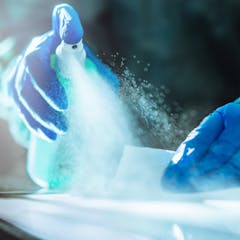
Articles on COVID-19
Displaying 241 - 260 of 7949 articles

In Canada, over 50 per cent of female students in Ontario have reported moderate to severe psychological distress. One in four girls has been sexually abused by the time they turn 18.

With the emergency phase of the COVID-19 pandemic in the rearview mirror, at least for now, we look back on a handful of stories that provided sharp insights at key moments in the pandemic.

The COVID pandemic has led to a radical rethinking of the limits of architecture and tested the skill and innovation of architects like never before.

Could CBT, a widely used form of ‘talking therapy’, help people who have persistent fatigue after having COVID? A recent study suggests it could.

Workplace absences, along with sales lost due to the cessation of brick-and-mortar retail shopping, airline travel and public gatherings, contributed the most.

Gaps in swimming lessons, lifeguard shortages and climate change may make water-based activities even riskier this summer.

After previous public health emergencies likes SARS and H1N1, there was renewed investment in pandemic preparedness, but it was not sustained. We cannot make the same mistake after COVID-19.

We found the protection offered by COVID vaccines wanes more quickly in people with severe obesity compared to those of normal weight.

Home working was implemented during the pandemic to contain the spread of COVID. But how did it affect our mental health?

Time and information is of the essence when tackling infectious diseases across countries and continents.

The emergency status allowed the federal government to cut through a mountain of red tape, with the goal of responding to the pandemic more efficiently.

A long-term view on building up British business is key to showing the UK is ‘open for business’.

Quaternary ammonium compounds, also known as QACs or quats, are commonly used antimicrobials also found in many household products. Soap and water may be a safer bet when cleaning surfaces.

Precautions taken in response to COVID-19 explain some but not all of the recent long delays in getting a passport.

There’s no one-size-fits-all approach for long COVID treatment, but exercise focusing on breathing and pacing yourself throughout the day often helps.

Training for academics needs to be timely, specific, relevant and appropriate for the technology being implemented.

From cancer immunotherapy and antibiotics to GMO crops and pandemic surveillance, gain of function is a cornerstone of basic research.

COVID no longer constitutes a public health emergency of international concern, but we need to be better prepared for future pandemics.

Three forces are pulling down ESG’s once-rapid rise in the investment world.

This variant seems to be causing a new symptom not commonly seen with earlier COVID strains.
